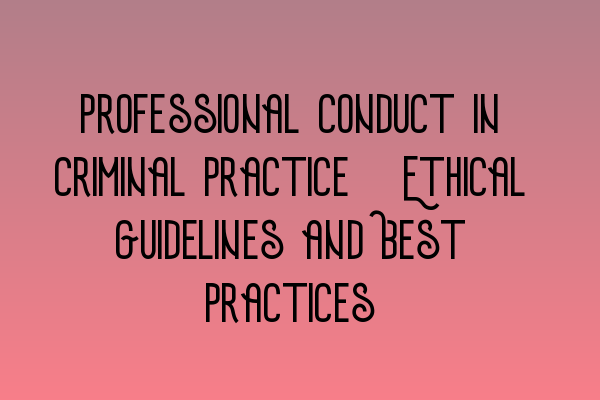Professional Conduct in Criminal Practice: Ethical Guidelines and Best Practices
As a solicitor engaging in criminal practice, it is essential to adhere to ethical guidelines while providing the best possible service to your clients. Professional conduct not only upholds the integrity and reputation of the legal profession but also ensures fair and just outcomes for all parties involved.
The Importance of Ethics in Criminal Law Practice
Being ethical in criminal law practice is of utmost importance as it fosters trust and confidence in the legal system. Clients trust their solicitors to uphold the highest standards of professionalism, integrity, and confidentiality. By adhering to ethical guidelines, solicitors can create a positive impact on their clients, the legal profession, and society as a whole.
Key Ethical Guidelines for Criminal Practitioners
1. Competence and Diligence
As a criminal solicitor, it is crucial to possess the necessary knowledge, skills, and expertise to handle criminal cases effectively. Keeping up with the latest developments in criminal law and staying updated with relevant precedents is essential. Competence and diligence ensure that you can provide the best legal representation to your clients.
2. Confidentiality
Confidentiality is an essential aspect of the solicitor-client relationship. Criminal practitioners must protect the confidentiality of their clients’ information. Breaching confidentiality could not only harm the client but also jeopardize the fairness of the legal process. Always ensure that you maintain the highest level of confidentiality and only disclose information when authorized or required by law.
3. Conflict of Interest
Avoiding conflicts of interest is vital to maintain professional integrity and credibility. It is essential to assess potential conflicts of interest before taking on a criminal case. If a conflict of interest arises during the course of representation, it should be disclosed to the parties involved and appropriate action should be taken to resolve the conflict.
4. Honesty and Integrity
Honesty and integrity go hand in hand in criminal practice. As a solicitor, you must be honest and straightforward with your clients, the court, and other parties involved in the case. Lying or deceiving can lead to severe consequences, including loss of credibility, professional misconduct, and even criminal charges.
5. Respect and Courtesy
Respect and courtesy should be at the forefront of every interaction within the criminal justice system. Treat clients, colleagues, court officials, and other individuals involved with respect and professionalism. Cultivating a positive and professional demeanor contributes to a fair and just legal process.
Best Practices in Criminal Law Practice
In addition to adhering to ethical guidelines, following best practices can enhance your effectiveness as a criminal solicitor:
1. Thorough Case Evaluation
Conduct a detailed case evaluation to identify the relevant legal issues, evidence, and potential defenses. This will help you develop a comprehensive strategy to represent your clients effectively.
2. Strong Communication Skills
Effective communication is key in criminal practice. Clearly explain legal concepts, procedures, and options to clients. Keep them informed about the progress of their case and maintain open lines of communication.
3. Diligent Case Management
Manage your cases diligently by organizing documents, deadlines, and court appearances. Timely and accurate record-keeping is crucial to avoid any procedural errors or missed opportunities.
4. Continuing Professional Development
Stay updated with the latest developments in criminal law through continuous professional development. Attend relevant seminars, conferences, and training programs to enhance your knowledge and skills.
5. Client-Centered Approach
Adopt a client-centered approach by understanding your clients’ needs, concerns, and goals. Tailor your legal strategy to achieve the best possible outcome for your clients based on their individual circumstances.
Remember, maintaining professional conduct and following best practices not only benefits your clients but also contributes to your own professional growth and the overall integrity of the legal profession.
If you wish to further enhance your understanding of criminal law practice and prepare for the upcoming SRA SQE exams, we recommend checking out the following related articles:
- SQE 1 Practice Exam Questions
- SQE 1 Practice Mocks FLK1 FLK2
- SQE 2 Preparation Courses
- SQE 1 Preparation Courses
- SRA SQE Exam Dates
These resources will provide valuable insights and help you excel in your criminal law practice.
